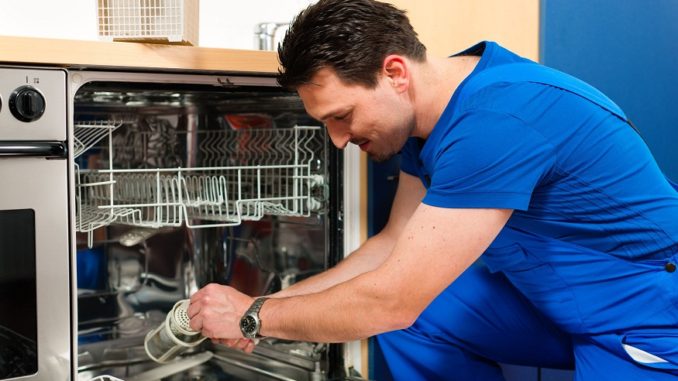
A dishwasher is an integral part of your kitchen. If it stops working, you’ll have to clean all the dishes by yourself, which can be extremely annoying. This is the reason why people immediately seek professional dishwasher repair services as soon as their unit encounters a technical problem.
However, the good news is that the majority of dishwasher problems don’t require professional skills or tools. You can easily diagnose the problem by yourself and fix it without any hassle. In this article, we are going to talk about the most common dishwasher issues and how to troubleshoot them by executing DIY repair.
It doesn’t matter which dishwasher model you have installed in your kitchen, these tricks will help you repair a broken dishwasher and avoid the strenuous task of cleaning dirty dishes.
1. Dishwasher Does Not Turn On
If your dishwasher does not turn on at all, it’s quite possible that the unit is not getting the required electrical power. So, before opening the dishwasher unit, make sure to take a look at the power socket and check if it’s working properly or not. You can use a voltage tester to check if there’s a current in the dedicated socket or not.
If it’s not receiving any current, go ahead and check the central circuit box. There are many situations when the circuit breaker automatically trips to protect the electrical appliance in case of high voltage. If that’s the case, all you have to do is turn on the circuit breaker again.
If the dishwasher won’t turn on even after receiving electric power, check the door switch, and see if it’s working or not. Keep in mind that a dishwasher will never turn on as long as its door is open. So, if you’re encountering any issues with the door switch, either adjust the door latches yourself or call a dishwasher repair technician to fix the problem.
2. Dishwasher is Not Cleaning the Dishes
This is a common dishwasher problem that many people encounter with their unit. If your dishes come out partially cleaned, the first step would be to ensure that the dishwasher is not overloaded. Each dishwasher unit has a dedicated capacity and if you add more dishes, it won’t clean them properly. You can refer to the manufacturer’s guide to check the capacity of your dishwasher.
Another factor that might restrict the dishwasher from properly cleaning the dishes is a dirty/damaged spray arm. Check your dishwasher’s spray arm and if you see any signs of damage, replace it with a new one. If you don’t know how to install a new spray arm in a dishwasher, it would be better to hire a dishwasher repair expert.
In case the spray arm is intact, check if it properly spins or not. When the spray arm doesn’t spin freely, it won’t rinse all the dishes properly. In this case, remove it from the unit and thoroughly clean it to remove debris.
3. Water Doesn’t Fill in Dishwasher
If your dishwasher turns on but does not fill properly, there’s something wrong with the water inlet valve. Locate the inlet valve under the sink and ensure that it’s turned on. If you don’t know how to turn on the valve, simply turn it counterclockwise. Also, inspect the valve and check if you see any signs of damage. In case the valve is damaged, you’ll have to install a new one to ensure that the dishwasher gets a proper supply of water.
If the inlet valve isn’t damaged and your dishwasher still doesn’t fill properly, it might be draining water too soon. This generally happens when the drain pump does not work effectively. Since inspecting the drain pump can be beyond your expertise, let a professional dishwasher repair technician repair/replace it.
Dishwasher Maintenance Tips to Avoid Unexpected Failures
So, these are the three most common dishwasher problems and their dedicated solutions. Now, if you want to avoid such issues in the future, there are a few maintenance tips that’ll help you keep your dishwasher safe. These tips include:
Always ensure to regularly clean the dishwasher filter otherwise debris can accumulate and make the dishwasher develop an unpleasant odor.
Never overload the dishwasher more than its capacity. If you have too many dishes, make sure to clean them in batches
Rinse the dishwasher with vinegar every week to remove stains
Make sure to clean the gasket on the door so that it shuts down completely and doesn’t cause water leakage problems
Make it a habit to clean the spray arms to remove debris
These five tips will ensure that your dishwasher continues to work without encountering any unexpected problems. However, if it still stops working and you don’t know how to fix the problem, call a dishwasher repair company and let an expert repair the unit.

Leave a Reply